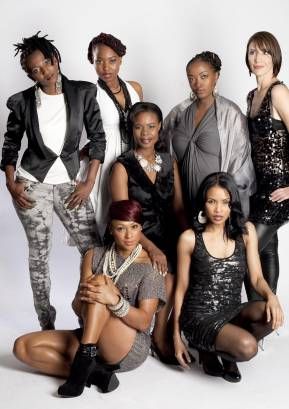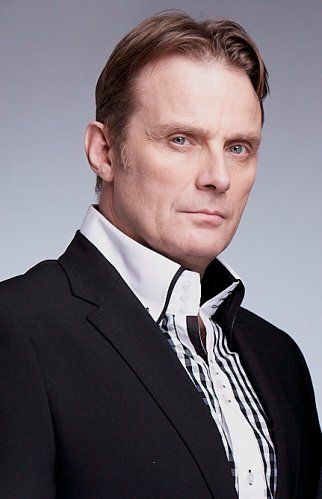
This soapie caught my attention two weeks ago when they explored a storyline based on an investigative journalist who goes undercover and comes up with a pretty damning article about the criminal underworld. Then, the police subpoenaes the journo to surrender all her notes and info she gathered during the process of compiling her article.
They had a very good storyline there. I know soapies are fictitious and everything. It goes without saying that the journalist, Thembeka, was excited about her big scoop yet nervous about what the police will say.

Scandal! cast
You see, in South Africa, the law doesn't necessarily allow law enforcement agencies to force journalists to reveal their sources. Even if the police does, there are bodies that can be involved in this instances, namely, the South African National Editor's Forun (Sanef) and The Press Council of South Africa.
I don't know how the story ended because it was Easter Weekend and I got hospitalised and when I tuned in again, the storyline was no longer a prominent lead. However, I do remember watching and The Voice editor, Eddie, warning the lady journo that she may be arrested if she refused to reveal her sources and surrender her notes.

The Voice editor, Eddie Khumalo
Scandal! producers and storyliners forgot to do their research on this storyline. A quick look at The Press Code Council of South Africa shows that:
Section 16 of the Constitution of the Republic of South Africa enshrines the right to freedom of expression as follows:
(1) Everyone has the right to freedom of expression, which includes:
(a) Freedom of the press and other media;
(b) Freedom to receive or impart information or ideas;
among other expressions.

Scandal! and The Voice production editor, Wayne
The council continues to state that: The basic principle to be upheld is that the freedom of the press is indivisible from and subject to the same rights and duties as that of the individual and rests on the public's fundamental right to be informed and freely to receive and to disseminate opinions; and
The primary purpose of gathering and distributing news and opinion is to serve society by informing citizens and enabling them to make informed judgements on the issues of the time; and
The freedom of the press allows for an independent scrutiny to bear on the forces that shape society.
Based on this, the police in the soapie didn't have basic fundametal rights to subpoena the jouranalist to give evidence in a court of law and and it is actually laughable that the police in real life and the soapie do resort to this.
Meanwhile, Isidingo ran with a more or less same storyline when Lolly went undercover to find a story about some sort of a semi-brothel where under-aged young women are being forced to entertain male clientele. Well, Lolly took risks and she eventually got caught. The story was simply showing possible dangers of going under cover to find a story.

Hard Copy did things write and wrote accurate stories
Scandal had a great storyline but messed up everything and it was clear that the story lacked research such as doing some reading on the subject matter and interviewing relevant parties such as investigative journalists, Sanef, the Press Ombudsman, and many other relevant media institutions.
Scandal! positions itself as a newsroom soapie but fails to show the true reflection of a newsroom. Some of their journalists are eloquently dressed - a far cry from the dress code of real journos. Journalism is one of the lowest paying professions in the world. Therefore, journos are not concerned with material things.

Shakira's magazine Scandal. Shakira goes out of her way to influence events outcome and I'm sure editors at the Heat and Sunday World offices don't do this.
The soapie doesn't do any justice to the profession, well except in its Scandal! magazine where Shakira is doing all the right things including getting Khanyi Mbau to kiss a girl. Did I just say Shakira is doing all the right things? I'm wrong.
The Ethical Journalist by Gene Foreman, states that a journalist shouldn't do anything to influence the outcome of events a journalist is writing about. I.e, if a journalist knows identity of a killer such as the one that the Scandal! journo wrote about, the journo cannot volunteer the identity to the police. "Journalists cannot be seen as police agents," protests Debora Patta.
Also, if the police were chasing a criminal and a photo-journalist is busy taking pictures of the unfolding events and the photo-journo finds him/herself in a situation where he can help catch the chased criminal, he/she cannot do so because that is influencing the outcome of police work. Journalists are not Community Police Forums.

Scandal! magazine editor Shakira
You see, Shakira influences many events to get scoops for her gossip magazine Scandal! which is something Heat, Sunday World, Sondag and Sunday Sun journos and editors will not agree with. As much as tabloid journalists want a juicy story, they are still guided by journalism principles and codes that govern this profession. "Ethical journalists, regardless of their platform, are credible," writes Foreman in his book.

This books takes an indepth look at journalism ethics. Scandal! producers and storyliners may want to buy themselves a few copies to educate themselves.
Foreman also states that journalists must keep in mind that their job is to simply inform their audiences and that means being a good resourceful reporter who gets the story into the paper, on the air, or on the web. This, is what the Scandal! soapie did right but the context in which the storyline unfolded was all wrong and just simply not true. More over, the story was not done indepth.

Making headlines: ENews Channel group news editor Ben Said and ENews Channel journalist Mpho Lakaje outside the Johanesburg Magistrate Court where the two journos were subpoenaed to reveal identity of their sources
These days, art imitates life. It is not a secret that the storyline was inspired by ETV and or ENews Channel's story when the channel's journo, Mpho Lakaje, found himself battling with the police about revealing the identity of a Soweto man who confessed to plotting to mug visitors during the 2010 Fifa World Cup. Mpho could have never been arrested for doing his job. It is the police's job to look for criminals, not journalists. Any good journalist will never refuse to interview a hardcore criminal.

Look fit for the editor: Sandy Mokwena plays Eddie Khumalo
Journalists often come under fire from critics saying they just want to sell their papers and that they don't care about society. The soapie Scandal!, through its magazine Scanda!, further perpetuates this notion which is untrue. "Decisions about news coverage tend to be portrayed by critics as calculated to sell newspapers or raise broadcast rating [ENews?] rather than to give the citizens the information they need," says Foreman in his book under the heading of The case for voluntary ethics standard. "But [journalists] have an obligation to themselves and their colleagues to never deliberately conduct themselves in a way that would justify the criticism. They have an obligation to practice sound ethics."

Many productions still have a great deal to learn from Isidingo
While still at it, let me also state that I am puzzled with the way journalists are portrayed on TV, well, except for journalists in Isidingo. That's one production that knows its story. Journalists are shown as heartless and abrasive people which isn't true at all. All in all, over 95% of South African TV productions that feature journalism as part of their storylines, fail to capture the essence of what journalism and journalists are all about.
Hard Copy was one brilliant production that got everything right and in its effort to show journalists do make mistakes, treated their storylines sensitively and in a way that does this profession great justice.
In closing, I would like to state that Scnadal! doesn't do any justice to the journalism profession.
Picture sthrough the lens of ETV, Gallo Images and others sites on the net. Makisto sends out his love to all web content managers for programming the pictures in such a way that I can copy them.